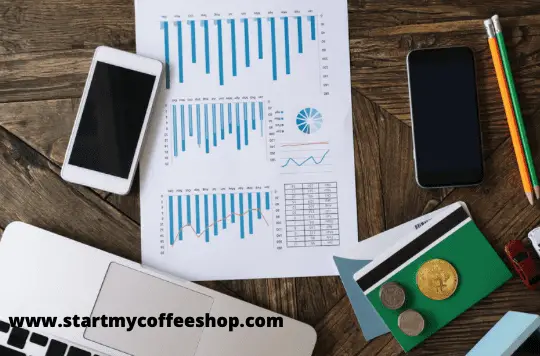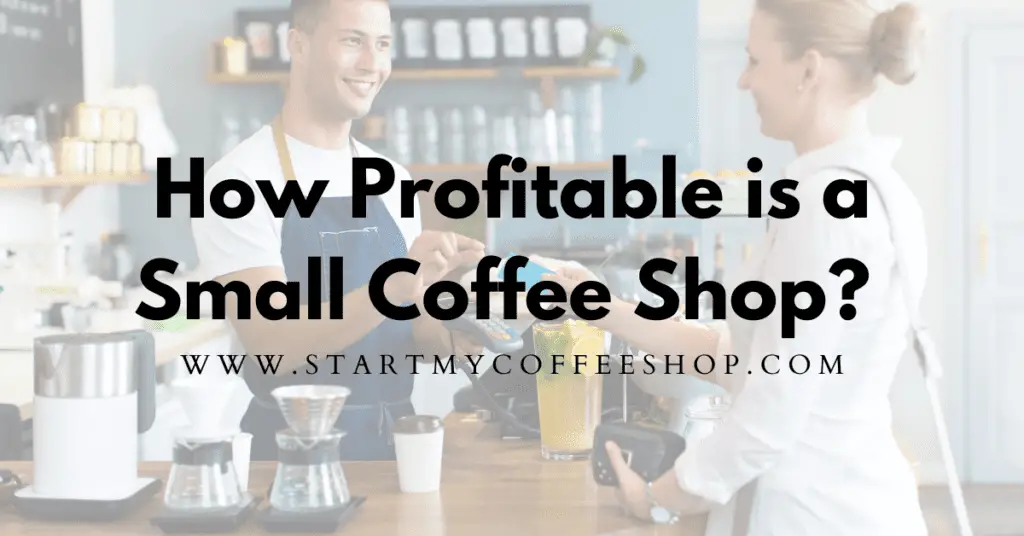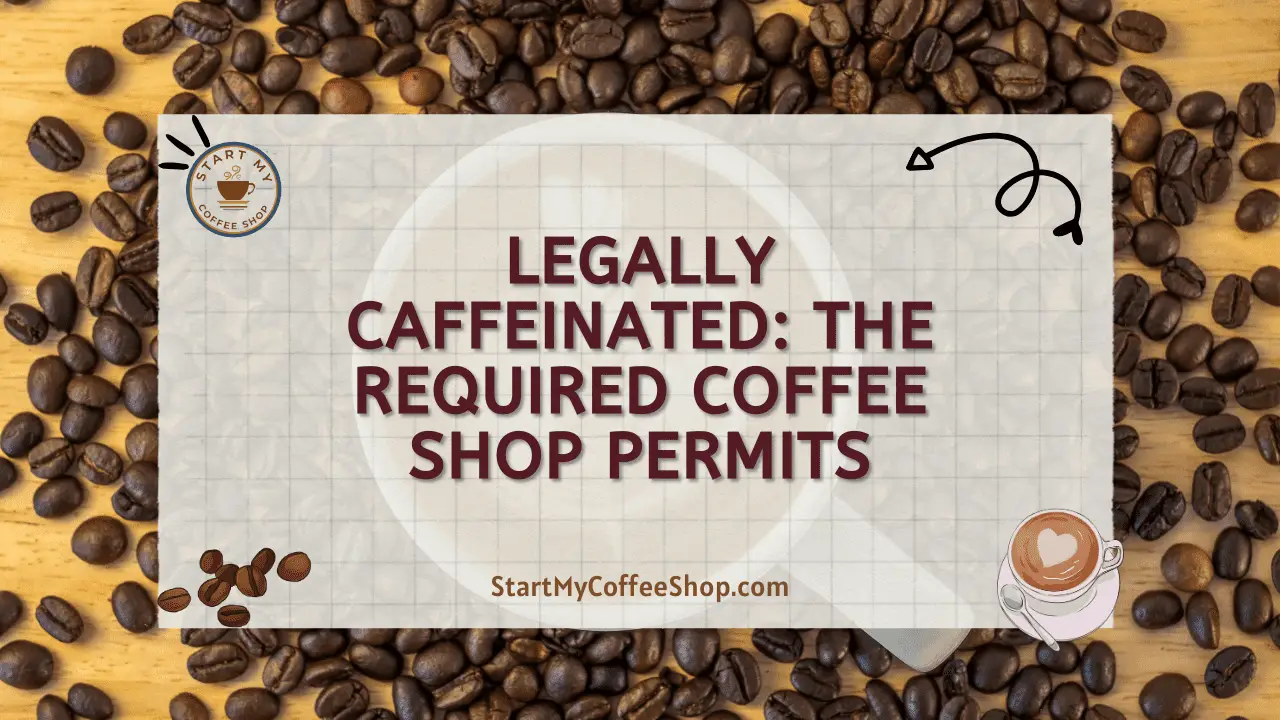Coffee shops seem to be popping up everywhere. In the United States alone, there are 37,189 coffeehouse stores as of the year 2020 with a market share of $45.4 billion, per Statista. According to Urban Bean Coffee, 64% of Americans aged 18 and over drank coffee every day as of 2019. The website The Business of Business states that the average person in the United States spends $1,100 per year on coffee. With people flocking to national chains such as Starbucks and Dunkin Donuts, is there any place left for the small coffee shop in America? Better yet, is owning a small coffee shop ring profitable anymore?
The average profit margin for a small coffee shop is 2.5 percent, which is much lower than the big coffee chains. Because direct costs average approximately 15 percent of a small coffee shop’s operating expenses, small coffee shops must sell their product in extremely high volumes to be profitable, according to the Houston Chronicle.
There are many factors that go into making a small coffee shop successful, and there are many expenditures that you will incur as a small business owner. These operating expenses include startup costs, rent or mortgage; labor expenses; insurance premiums; legal fees; and advertising and marketing expenses.
Startup Costs
As is the case with any small business, you will incur quite a few startup expenses when you start your own coffee shop. The website How To Start An LLC states that it will cost you anywhere from $25,000 to $300,000 to start a small coffee shop. Of all of the startup costs associated with starting a coffee shop, your supplies and equipment are going to be the highest costs.
 You can attempt to save a little money by trying to purchase previously owned machines for your small coffee shop; I would not suggest that. New machines come with a warranty, while previously owned machines may not.
You can attempt to save a little money by trying to purchase previously owned machines for your small coffee shop; I would not suggest that. New machines come with a warranty, while previously owned machines may not.
I have listed several pieces of equipment, along with supplies, that you are going to need to open a small coffee shop. I have also given the average price of these supplies and equipment below:
- Coffee – Expect to spend around $1,000 for your first month supply of coffee
- Milk – You are going to need around 15 gallons, or approximately $45 worth, of milk for your first month
- Sugar – A month’s supply of sugar is going to cost you around $75
- Water Filtration System – this necessity will cost you between $650 and $800
- Espresso Machine – A high-quality, commercial-grade espresso maker will cost anywhere from $10,000 to $20,000
- Drip Coffee Machines – A full drip coffee setup will cost approximately $1,500
- Refrigerators – Depending on the space your coffee shop needs, expect to spend between $1,000 in $2,000
- Coffee Grinders – Espresso coffee grinders cost around $1,400 to $3,200. Drip coffee grinders will cost you in the neighborhood of $1,000
Rent or Mortgage
Next to startup costs, your rent is going to be the second-largest operating expense your small coffee shop has. There are several factors that can determine how much you are going to pay for rent. A few of these factors include location, square footage oh, and the condition of the building. Location and the condition of the building generally go hand-in-hand because that our buildings are most often found in better neighborhoods.
If you are planning to build a brick-and-mortar coffee shop from the ground up, there are going to be several costs associated with this particular business venture. You are probably going to have to hire an architect to design your building. You are also going to have to hire a construction crew to make sure that the building gets built. There are also many permits that you are going to have to obtain to make sure that your coffee shop gets built.
Purchasing an existing space may be a better option because there are going to be fewer costs associated with buying an existing building. If you purchase an existing building, make sure that it suits the needs of your coffee shop. Remember, you can always make adjustments and additions later as your business grows.
Labor Expenses
A business is only as good as its employees. That’s why your labor expenses are one of the most important operating expenses your business will incur. Hiring quality employees is a process that takes time, patience, and a significant amount of money. However, it will all be worth it when your coffee shop is staffed according to your expectations.
 One of the aspects of labor expenses that most people don’t realize is that they do not stop with your employees’ salaries. Other labor expenses associated with running your coffee shop may include payroll taxes, employee benefits, and even 401K contributions. You may decide not to offer 401K matching or employee benefits, but you are still going to have to pay payroll taxes. Unfortunately, that’s one expense that you will not be able to escape.
One of the aspects of labor expenses that most people don’t realize is that they do not stop with your employees’ salaries. Other labor expenses associated with running your coffee shop may include payroll taxes, employee benefits, and even 401K contributions. You may decide not to offer 401K matching or employee benefits, but you are still going to have to pay payroll taxes. Unfortunately, that’s one expense that you will not be able to escape.
I would sincerely advise against skimping when it comes to labor expenses. There is an old saying that says that you get what you pay for. If you want quality employees, you are going to have to offer a competitive salary. You will probably also have to offer some employee benefits or incentives to keep your employees happy. I would suggest doing this because happy employees usually make customers happy as well.
Insurance Premiums
While you may not legally be required to carry insurance on your coffee shop, I would highly suggest at least investing in a good liability insurance policy. The insurance provider Geico states that liability insurance covers damages and injuries to a person or property caused by an accident at which you are at fault.
There are two different aspects of liability insurance, which are bodily damage and property damage. Bodily injury pays for any injuries suffered in an accident, while property damage covers damage to a property by which you are responsible. I strongly suggest having property and liability insurance because you never know what the future holds. Accidents can happen in the blink of an eye, and you want to be covered when the inevitable happens.
As I’m sure you can see, having insurance, I text you against costly lawsuits. Your premiums may seem like an unnecessary expense right now, but you will thank me when they prevent you from getting sued as a result of an accident that caused either bodily injury or property damage.
Check out more start up information HERE.
Legal Fees
Just like insurance, having legal fees may seem like an unnecessary operating expense that your coffee shop does not need. However, I would disagree. You never know when having a lawyer at your coffee shop’s disposal will pay huge dividends. There are many benefits to having an attorney on retainer for your small business.
According to FL Patel Law, a few of the many benefits of having a business lawyer for your small business include:
Helping you to choose a proper small business structure
Preventing lawsuits
Assisting you in drafting contracts
Helping to protect your intellectual property
Assisting you with real estate leases and agreements
When factoring in your operating expenses, I would strongly suggest budgeting for the ability to keep an attorney on retainer. Again, you may find it to be an unnecessary expense. However, having an attorney on hand can prevent you from losing tens or hundreds of thousands of dollars in costly lawsuits.
Advertising or Marketing Expenses
Advertising and marketing expenses are other important operating expenses that will help you to grow and expand your coffee shop. There are many avenues of marketing that you can pursue your coffee shop. Some of these will be free of charge, While others will have a cost associated with it.
So, how much should you spend on advertising and marketing? I’m glad you asked. The website Vendux states that the US small business administration recommends allotting 7 percent to 8 percent of your gross revenue as your advertising and marketing budget. While there are marketing firms that can design an advertising campaign to suit your coffee shop, there are many ways to advertise your business that will cost you nothing at all.
One of the most effective ways to advertise your coffee shop is something that I would wager that you use every single day. Of course, I’m referring to your social media accounts. You can use Twitter, Facebook, Instagram, and Tik-Tok to your advantage by using them as marketing tools for your coffee shop. However, I would recommend using separate profiles for your personal social media and your business social media. Another tip I would like to offer is that you should always keep it professional, whether you are using your personal or business social media. Remember that you are representing your business at all times and should act accordingly.
Case Study Example:
A small coffee shop owner in Ohio recently itemized all of his revenue and expenses as an example of what the average small coffee shop owner can expect in regards to profit. It was as follows:
Trailing twelve months revenue – $296,000
COGS / food, drink, apparel / – $93,000 (31.4%)
Materials and Supplies / cups, napkins, towels, toilet paper, etc. / – $15,000 (5%)
Labor – $63,000 (does not include salary to myself) (21.2%)
Advertising – $5,000 (1.7%)
Rent – $7,200 (2.5%)
Utilities – $8,300 (2.8%)
Repairs and Maintenance – $5,300 (1.8%)
Insurance, Taxes, Licenses, Office Supplies – $4,200 (1.4%)
Credit Card Fees and Loyalty Program – $5,300 (1.8%)
Loan payback – $9,500 (3.1%)
Everything else – $5,900 (3.8%)
Profit before paying myself – $74,500 (25.2%)
That would put his profit somewhere around $45,000 (15.2%).
Conclusion
We have learned that with a profit margin of around 2.5 percent, your small coffee shop may not be as profitable as some of the larger franchise chains. However, it can still be profitable. Unfortunately, there is nothing that you can do in regards to fixed costs such as rent or mortgage. You can make changes to the variable expenses associated with your operating expenses if you want to be more profitable. A few of the things that you can change or because of your supplies by switching vendors; cost of your equipment by shopping around, or purchasing previously owned equipment; and by making your coffee shop more efficient and ergonomic for your workforce.

Frequently Asked Questions
One of the great debates in business, whether large or small, is whether to incorporate yourself or to start LLC. The website How To Start an LLC recommends making your small coffee shop a limited liability company. This is recommended because of your ability to separate your business and your personal assets. You are also getting a straightforward business structure.
To answer this, let’s take a look at the definition of the term ergonomics, which is the study of efficiency in the workplace. Your coffee shop should be ergonomic because it allows your employees to be much more efficient and productive, which means that they are serving your customers faster. Customers that are served in a friendly and speedy manner will be much more likely to become repeat customers.
To learn more on how to start your own coffee shop checkout my startup documents here
Please note: This blog post is for educational purposes only and does not constitute legal advice. Please consult a legal expert to address your specific needs.

Hi! I’m Shawn Chun
My adventure in coffee began when I first launched my first coffee shop back in the early 2000s. I had to figure out so many things on my own and to make it worse within 2 years of opening two large corporate coffee chains moved in just blocks away from me!
As I saw smaller and even some larger coffee shops in the neighborhood slowly lose customers to these giant coffee chains and slowly close up shop, I knew that I had to start getting creative…or go out of business.
I (like you may be) knew the coffee industry well. I could make the best latte art around and the foam on my caps was the fluffiest you have ever seen. I even had the best state-of-the-art 2 group digital Nuova Simonelli machine money could buy. But I knew that these things alone would not be enough to lure customers away from the name brand established coffee shops.
Eventually, through lots of trial and error as well as perseverance and creativity I did find a way to not only survive but also thrive in the coffee/espresso industry even while those corporate coffee chains stayed put. During those years I learned to adapt and always faced new challenges. It was not always easy, however, in the end, I was the sole survivor independent coffee shop within a 10-mile radius of my location. Just two corporate coffee chains and I were left after that year. All told the corporate coffee chains took down over 15 small independent coffee shops and kiosks and I was the last one standing and thriving.
Along the years I meet others with the same passion for coffee and I quickly learned that it is not only “how good a barista is” that makes a coffee shop successful, but the business side of coffee as well.
Hence why I started this website you are on now. To provide the tools and resources for up and coming coffee shop owners to gain that vital insight and knowledge on how to start a coffee shop successfully.
Stick around, browse through my helpful blog and resources and enjoy your stay! With lots of LATTE LOVE!
Shawn






